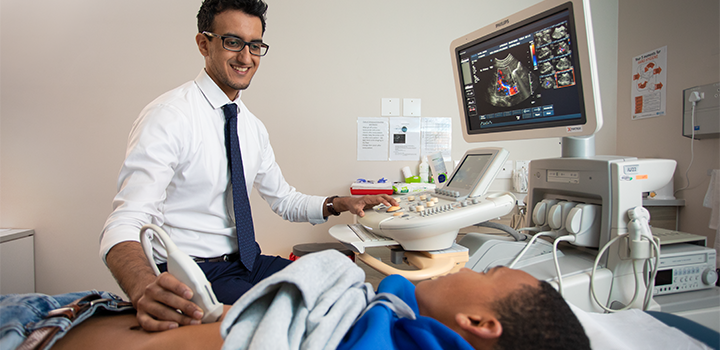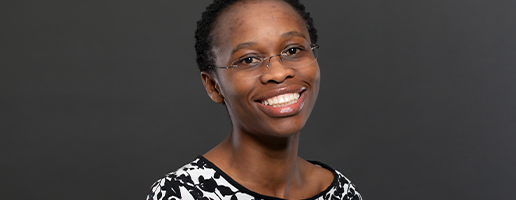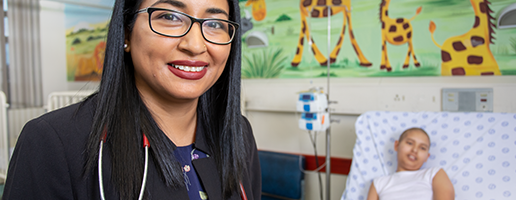Finding better ways of helping children fight TB

Dr Vishesh Sood, a final-year radiology registrar working at the Red Cross Children’s War Memorial Hospital in Cape Town, received a Discovery Foundation Award to investigate the value of using an abdominal ultrasound to diagnose TB in children.
Mention the words ‘abdominal ultrasound’ and ‘tuberculosis’ in the same breath to radiologists or physicians and you will have yourself a debate. However, for paediatricians, it does offer significant value when all other factors are considered.
Dr Vishesh Sood, a final-year radiology registrar working at the Red Cross Children’s War Memorial Hospital in Cape Town, explains, “As doctors, we prefer to avoid radiation from CT scans in a young child, while access to MRIs are limited, making ultrasounds particularly useful.”
Radiologists and their colleagues working with children have become somewhat accustomed to the unpredictability of abdominal ultrasound scans to provide indicators for TB because of the wide variation in reporting. However, there is often a request for abdominal ultrasound scans when there’s a ‘failure to thrive’ diagnosis, or when a child doesn’t gain weight at the expected rate, and TB is a possible reason.
Going where few have dared
Dr Sood decided it was time to take on a difficult task. “I think it’s as simple as nobody getting around to researching this. Consultants are busy and do not necessarily have the time to undertake all of the possible research questions that arise. I came across so much talk about it, so I decided to go for it.”
He plans to study the use of abdominal ultrasound scans in the diagnosis of paediatric TB. Because abdominal ultrasound scans can detect features of TB, it has become a popular diagnostic tool. However, determining whether imaging results such as enlarged lymph nodes or splenic abscesses are consistent with TB is not an exact science yet.
“We know there is a high likelihood that a scan displaying such features will be abdominal TB, but other conditions can also present this way. We only hope that our colleagues think and report about it in the same way, though at present, it tends to be quite variable,” Dr Sood says. His research will be aimed at standardising the reporting of ultrasound exams for abdominal TB (indeterminate, normal, or likely to be TB), and clarifying the parameters for use of the investigation.
He will do this by reviewing hundreds of examination findings over five years, from January 2013 to December 2018, at Red Cross Children’s War Memorial Hospital, calculating the percentage of those considered positive for abdominal TB, and the range of diagnostic findings. Two paediatric radiologists will also review the positive findings to see that they agree on the features representing abdominal TB. Vishesh will then correlate this data with a number of clinical and biochemical parameters relating to a TB diagnosis.
He adds that when considering environmental factors like TB infection in family members, patients with HIV will be more likely to spread their TB infection.
Asked why the abdomen is a target for diagnosing TB when it normally affects the lungs, Dr Sood says that because of South Africa’s high prevalence of HIV and malnutrition, patients routinely present with TB that has spread to the abdomen or brain, and that TB meningitis is all too tragically common.
Children are innocent victims of TB
“The sad part is that children are innocent bystanders in this epidemic. They’re not responsible; it’s in their environment. If they are exposed and don’t get treated, it’s not their fault. Their entire lives can be derailed by a single episode that is treated too late, resulting in advanced lung disease. It affects their growth and development, their ability to go to school, play with their friends and to get on with their lives,” he says.
“Also, once their lungs are damaged, they’re predisposed to different kinds of infections throughout their lives. We see young adults coughing up blood because they previously had TB and now have an aneurysm in their thorax. It’s very sad,” he adds.
His GP mom was a huge influence
Dr Sood was born in the United Kingdom and his parents immigrated to South Africa when he was two years old. He went to Westerford High School in Rondebosch, studied medicine at the University of Cape Town and did his internship at Tygerberg Academic Hospital and his community service in Kimberley. Going into medicine was almost a no-brainer, he says. His mother, Geeta Dua, was a doctor at the Red Cross Children’s War Memorial Hospital where she still consults.
Dr Sood wants to sub-specialise in cardio-thoracic or interventional imaging, where minimally invasive techniques are used to perform complex procedures with significantly less morbidity. “I’ll need to go overseas to train at a high-volume centre, probably Australia, America or even Canada where my brother is working as a GP,” he says. Hopefully, his return to South Africa will further benefit his patients.
Improving accuracy is resource-friendly endeavour
Dr Sood’s success will have many benefits for patients and doctors. “If I can say that this test will be useful in certain well-defined clinical contexts that support the findings, there will be less pressure on resources all round, meaning that waiting times across disciplines will reduce.”
Asked what interventions he thought alleviate the burden of TB across South Africa, Vishesh says that besides TB’s social determinants, earlier diagnoses and appropriate interventions that can be followed through are of utmost importance.
“One of the biggest problems is treatment over long periods. For various reasons, adherence falters and TB patients becomes resistant to medicine. This is a scenario where medicine is hard to come by and you can have 18 months of treatment with no result,” he concludes.
About the Discovery Foundation
Each year, the Discovery Foundation gives five different awards to outstanding individual and institutional awardees in the public healthcare sector.
The Discovery Foundation is an independent trust with a clear focus to strengthen the healthcare system by making sure that more people have access to specialised healthcare services.
Since 2006, the Discovery Foundation has invested more than R230 million in training and support for more than 400 medical specialists and institutions. The grants support academic research and clinical science, sub-specialist training, rural medicine as well as programmes to develop public healthcare resources. For 2019, Discovery Foundation awarded 42 grants to medical specialists working in South Africa’s healthcare sector to the value of R27 million.
Learn more and apply for the 2020 Discovery Foundation Awards.
Related articles

The Eastern Cape's first foetal medicine candidate hopes to save lives
When 2019 Discovery Foundation Sub-Specialist Award recipient Dr Nontsikelelo Gubu-Ntaba was still in high school, her mother completed a Bachelor of Education degree. Seeing her mother pursue her dreams has inspired Dr Gubu-Ntaba to study further.

Training to help KwaZulu-Natal children fight cancer
Dr Kershinee Reddy has received a Discovery Foundation Sub-Specialist Award to study Paediatric Oncology at Stellenbosch University. She’s determined to return to KwaZulu-Natal after her training to help children fight cancer.

Making a difference for Mthatha’s children
With his Discovery Foundation Rural Individual Fellowship Award, Dr Andrew Oyemwimina investigated the prevalence of HIV infection among paediatric patients who were admitted to hospital in 2016 – the first study of its kind in the Eastern Cape.